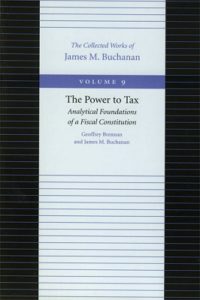The Power to Tax: Analytical Foundations of a Fiscal Constitution
By Geoffrey Brennan and James M. Buchanan
Publisher
none
- Foreword
- Ch. 1, Taxation in Constitutional Perspective
- Ch. 2, Natural Government
- Ch. 3, Constraints on Base and Rate Structure
- Ch. 4, The Taxation of Commodities
- Ch. 5, Taxation through Time
- Ch. 6, Money Creation and Taxation
- Ch. 7, The Disposition of Public Revenues
- Ch. 8, The Domain of Politics
- Ch. 9, Open Economy, Federalism, and Taxing Authority
- Ch. 10, Toward Authentic Tax Reform
- Epilogue
- Selected Bibliography
Epilogue
There is a science of economics that embodies conceptually refutable hypotheses to the effect that persons act so as to maximize objectively measurable value (net wealth) subject to the constraints that they confront. The constraints are presumed to be exogenous to the persons whose behavior is to be predicted. Empirical tests of these hypotheses are necessarily limited to behavior under constraints that have been historically experienced. The boundaries of predictive science are logically set by those of reality, quite apart from any considerations of practical issues concerning data meaning, collection, and usage.
It is perhaps not surprising that modern economists do not feel at home outside these boundaries. They become uneasy when issues about choices among constraints are raised. How can individual choice behavior outside the standard paradigm be modeled? How can a positive science of rules be derived?
The first step lies in the elementary recognition that the constraints that bound behavior within a social order are not exclusively exogenous. At least some proportion of the constraints are of man’s own making, the results of deliberative choice behavior. Some of the rules we live by are grounded neither in physical reality nor in the social evolutionary process but are, instead, the product of design and intent. From this recognition it follows that some rules of social order must be subject to modification and change, to “reform.”
But what criteria may be adduced to guide judgment? Clearly, empirical science is exhausted once behavior within existing and past rules is fully described. A change in rules necessarily requires that we “fly to others that we know not of.” Choice among rules is inherently speculative.
Speculation may, however, be reasoned. Analysis that models individual choice behavior under alternative sets of potential constraints becomes an essential part of a positive science of rules, where the hypotheses are only conceptually refutable rather than empirically testable. Choice among constraints embodies greater uncertainty about the properties of the alternatives than does choice within constraints. But the suggested transference of the modern economists’ analysis of “choice under uncertainty” to the choice among rules cannot be made without a full appreciation of the leap from one choice setting to the other. The criterion of expected utility maximization, widely held to be applicable to choice under uncertainty within constraints, may not be relevant or appropriate to choice among constraints themselves. The distinction here was sensed by John Rawls but was overlooked by most of his economist critics.
Rules may be chosen that place limits on extremes, even at some accurately reckoned cost in value. We need not predict that each child will fall off the cliff to justify the installation of railings. Minimax is descriptive of deeply felt human precepts of rationality. We seek to ensure that the best remains a potentiality by guarding against the worst. We seek “freedom within constraints.”
At a fundamental methodological level, our plea is not for a particular set of changes in existing rules. It is, instead, a plea that the choice of rules receives the attention it deserves in modern discussions of policy reform. Neglect of rules ensures drift into constitutional anarchy, a state of affairs that many modern diagnoses suggest has already been attained. In such a setting, confusion abounds, and the tentacles natural to a Hobbesian jungle take root, grab, and hold.
Modern man did change his sociopolitical rules; he did once emerge from the Dark Ages. In doing so, he was guided, not solely by science and not primarily by blind evolutionary change, but by the reasoned speculation of persons who dared to think in terms of rules other than those under which they lived. They dreamed of possible futures, and some of their dreams were realized. It is not without significance that the chapter-beginning citations included in this book are predominantly drawn from eighteenth- and early-nineteenth-century writers.

